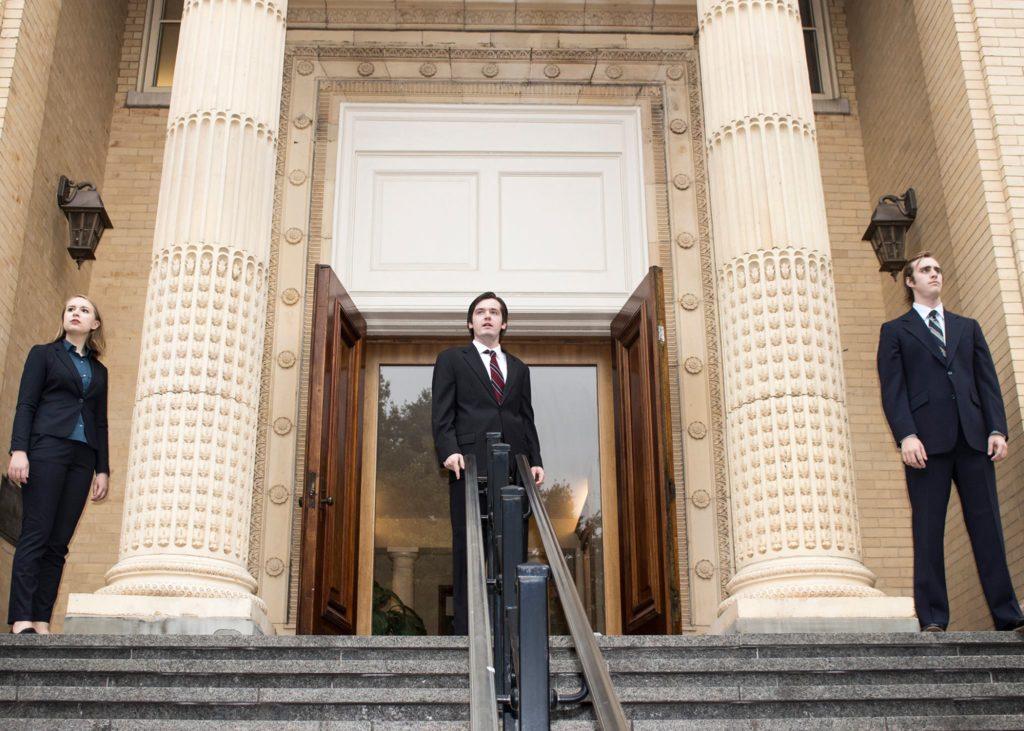“How many ages hence / shall this our lofty scene be acted over / in states unborn and accents yet unknown!” Cassius asks as he and his co-conspirators wash their hands in Caesar’s blood. The line is one of Shakespeare’s most prescient — spoken by a character in ancient Rome, written in 1599 and still resonant with modern politics in a country that did not exist at the time the play was written.
Georgetown University’s theater and performance studies program gives this line a new life in its upcoming production of “Caesar,” adapted from William Shakespeare’s play and directed by Anita Maynard-Losh, who also serves as the director of community engagement at Arena Stage, a Washington, D.C. theater company. “Caesar” is the second production in the program’s 2017-18 season, after “The Infinite Wrench,” a production presented last month in partnership with The Neo-Futurists, an American experimental theater company.
The play is centered on Julius Caesar, played by Charlie Trepany (COL ’19), who has recently returned triumphant to Rome after defeating his military rival and finds himself beloved by his subjects. Cassius, played by Kate Ginna (COL ’18), and other members of the Roman Senate worry Caesar is about to seize power as a king.
Convincing even Caesar’s friend Brutus, played by Eliza Palter (COL ’20), that the assassination is necessary to protect the people of Rome, the conspirators stab Caesar to death in the name of liberty and then must face the consequences of a capricious public and their own guilt and doubt.
“This play has a very strong resonance right now,” Maynard-Losh said in an interview with The Hoya. “I think that it speaks to us when we’re looking at our country in the present time and looking at the power and how power affects the people who have it, and how they sometimes want to challenge the representative government that we have.”
The staging itself incorporates elements of the historic and the present. The script uses parts of Shakespeare’s original text, preserving the male pronouns of some of the characters that are here played by women.
The set, designed by Elise Lemle (COL ’10), is a crumbling Roman cityscape, yet the actors wear modern clothing, such as suits and army fatigues, and the sound design echoes this modernity with sirens and gunfire. The characters also constantly film each other speaking; the images project onto the damaged building facades in a reflection of the modern ability to record and spread information.
“I wanted to explore to whatever degree we were able to, technologically, the concept of politics and performance. In our contemporary time, so much is recorded and so much is transmitted and so much is posted, moments that in the past would not be public moments,” Maynard-Losh said. “So how does that affect people in political power, if they know they are always or almost always on camera?”
The dichotomy of past and present is not the only one illustrated onstage; the divide between male and female actors is equally striking. Brutus, Cassius and all of the conspirators are played by women; Caesar, Marc Antony and almost all of Caesar’s supporters are played by men.
“I really wanted to have the conspirators be played by female actors and team Caesar played by male actors; that was part of my original idea for the production,” Maynard-Losh said. “I wanted to underscore the effect of rebellion, of revolution, with the conspirators, and give the opportunity for female actors to portray these really powerful and kind of badass characters as women.”
Despite the trappings of the dramatic — Caesar’s violent demise that ends with much of the cast smeared with blood and Antony’s funeral speech delivered by Alex Prout (COL ’19) inciting an easily swayed, restless crowd to violence — the real strength of the play is its firm grip on reality and sense of the present. In the wake of Caesar’s assassination, the city’s division into civil conflict and murder of innocent people plagues Brutus with self-doubt over whether, in the name of patriotism, he has truly done the right thing.
“There is something that is not successful about using means that are not coherent with your actual values in order to try to maintain those values,” Maynard-Losh said. “So the subtext, or the subtitle, perhaps, [is that] Romans destroy the Roman Republic by trying to save it. The very thing that they are trying to prevent is what happens anyway.”
“Caesar” runs Nov. 9 to 11 at 8 p.m. in the Gonda Theater. Tickets are available online at performingarts.georgetown.edu or by phone at 202-687-2787.




















